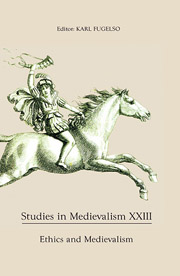Book contents
- Frontmatter
- Acknowledgments
- Contents
- List of Illustrations
- Epigraph
- Editorial Note
- I Ethics and Medievalism: Some Perspective(s)
- II Interpretations
- What if the Giants Returned to Albion for Vengeance? Crusade and the Mythic Other in the Knights of the Nine Expansion to The Elder Scrolls IV: Oblivion
- The Dark Ages of the Mind: Eugenics, Amnesia, and Historiography in Dan Brown's Inferno
- Plastic Pagans: Viking Human Sacrifice in Film and Television
- Meat Puzzles: Beowulf and Horror Film
- Words, Swords, and Truth: Competing Visions of Heroism in Beowulf on Screen
- Socialism and Translation: The Folks of William Morris's Beowulf
- “We Wol Sleen this False Traytor Deeth”: The Search for Immortality in Chaucer's Pardoner's Tale and J. K. Rowling's The Deathly Hallows
- Intention or Accident? Charles Alfred Stothard's Monumental Effigies of Great Britain
- Contributors
- Previously published volumes
Socialism and Translation: The Folks of William Morris's Beowulf
from II - Interpretations
Published online by Cambridge University Press: 05 May 2014
- Frontmatter
- Acknowledgments
- Contents
- List of Illustrations
- Epigraph
- Editorial Note
- I Ethics and Medievalism: Some Perspective(s)
- II Interpretations
- What if the Giants Returned to Albion for Vengeance? Crusade and the Mythic Other in the Knights of the Nine Expansion to The Elder Scrolls IV: Oblivion
- The Dark Ages of the Mind: Eugenics, Amnesia, and Historiography in Dan Brown's Inferno
- Plastic Pagans: Viking Human Sacrifice in Film and Television
- Meat Puzzles: Beowulf and Horror Film
- Words, Swords, and Truth: Competing Visions of Heroism in Beowulf on Screen
- Socialism and Translation: The Folks of William Morris's Beowulf
- “We Wol Sleen this False Traytor Deeth”: The Search for Immortality in Chaucer's Pardoner's Tale and J. K. Rowling's The Deathly Hallows
- Intention or Accident? Charles Alfred Stothard's Monumental Effigies of Great Britain
- Contributors
- Previously published volumes
Summary
William Morris's doctor is famously said to have declared that Morris died of “simply being William Morris, and having done more work than most ten men.” In literary circles he is perhaps best remembered for his Utopian text, News from Nowhere; thanks to his vital role in the emerging Arts and Crafts Movement, he is still remembered even now in interior-decorating circles for his remarkable range of product designs, most particularly wallpaper. His life was filled with an assorted array of enthusiasms and enterprises, but by the 1880s and 1890s, the last decades of his life, his focus had finally settled upon two consistent and enduring passions: first, the culture and literature of the so-called Old North and, second, the socialist movement. It is the relationship between these two passions that this chapter will examine.
The first passion actually went as far back as the 1860s and in the early 1870s included two trips to Iceland, a land he called a “terrific and melancholy beauty […] illumined by a history worthy of its strangeness.” He preserved his memories of the land in travel journals as well as in verse, but the greatest legacies of Morris's Old Northernism are probably the romances he set in reimagined proto-Germanic settings, such as The House of the Wolfings (1889) and The Roots of the Mountains (1890), as well as his collaborative translations of numerous Old Icelandic sagas and of Beowulf.
- Type
- Chapter
- Information
- Studies in Medievalism XXIIIEthics and Medievalism, pp. 167 - 188Publisher: Boydell & BrewerPrint publication year: 2014

